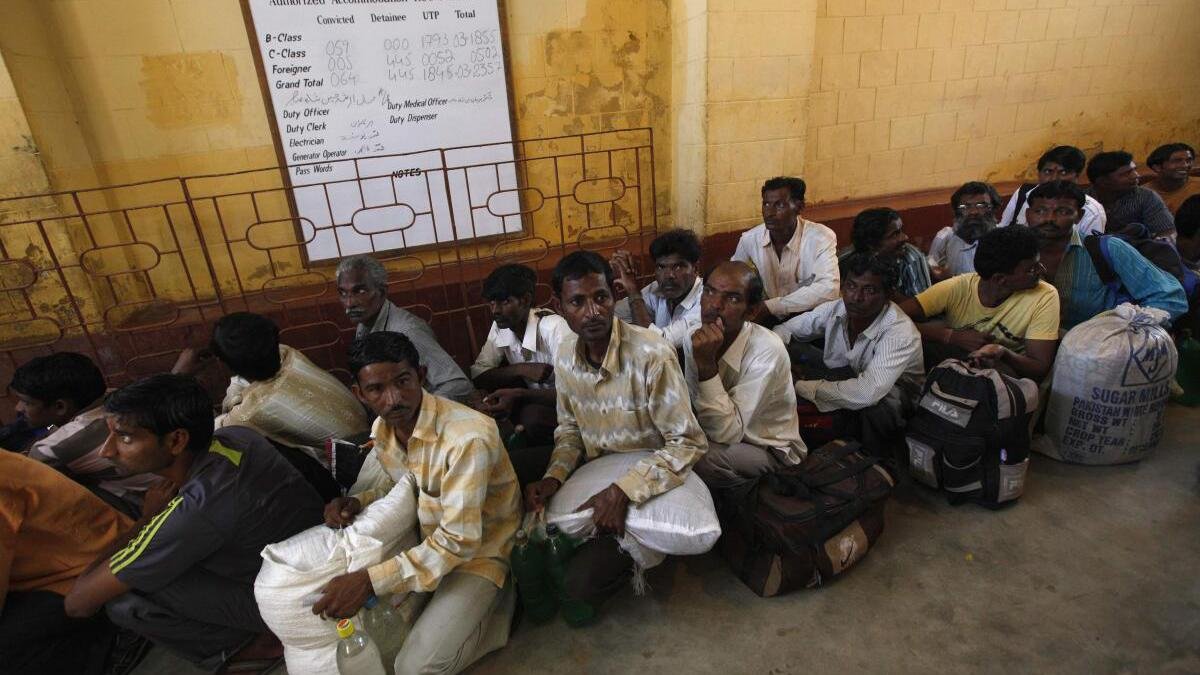About a week ago, a Qatar court commuted the death sentences of eight former Indian Navy personnel. The former Navy officers, employed by a Doha-based company, were arrested in August 2022 allegedly for espionage. This has brought to attention the issue of Indians incarcerated in jails abroad and the steps taken by the government to assist them in their legal battle.
Cases involving Indian prisoners in jails abroad, such as the one in Qatar, in which information about the charges has not been disclosed to the public so far, are rare. In countries such as Canada and the U.K., details about arrests are not made public due to strong privacy laws. However, details of most of the arrests of Indians abroad are in the public domain. Many involve fishermen who inadvertently crossed the international maritime boundary. In December last year, over 50 fishermen from Tamil Nadu and Puducherry were arrested by the Sri Lankan Navy. As per the latest data, 2,612 Indian fishermen were lodged in prisons across 10 countries — Iran (27), Sri Lanka (501), the UAE (5), Bangladesh (309), Bahrain (12), Myanmar (19), Pakistan (1060), Qatar (54), Saudi Arabia (564) and Seychelles (61) — between 2020 and 2022, for crossing the maritime border. Many were later repatriated.
As per the latest data, about 9,500 Indians are lodged in prisons across 89 nations (Chart 1). Notably, most Indian prisoners are in West Asian jails. Saudi Arabia (2,200 prisoners), the UAE (2,143), Qatar (752), Kuwait (410) and Bahrain (310) hold most of these prisoners. Nepal is the only other country in the list of the top six countries with over 1,200 Indian prisoners. Malaysia, Pakistan, the U.K., China, and the U.S. also hold a significant number of Indian prisoners.
Chart 1 shows the countries where the highest number of Indians are incarcerated.
Chart appears incomplete? Click to remove AMP mode
While crossing international maritime boundaries was the primary reason. Many Indians were also apprehended for murders, and drug-related and sexual offences (Chart 2). Human trafficking, smuggling, forgery, and fraud were other reasons.
Chart 2 shows the offences for which most of these people were arrested abroad.
Chart 3 shows the States from which Indian prisoners in jails abroad hail, in cases where such data could be ascertained.
This data has to be read cautiously as State-wise data for prisoners in most West Asian countries were not available. Punjab, West Bengal, Tamil Nadu, Gujarat and Manipur are the States from where most of these prisoners hail.
Chart 4 shows some instances where a large number of Indian prisoners in a foreign country hailed from a particular State. For instance, most of the Indian prisoners in the U.S. were from Punjab and Gujarat.
Many of the prisoners in the Philippines were from Punjab. A majority of the prisoners in Singapore, Sri Lanka, and Maldives were from Tamil Nadu. In Bangladesh, Bhutan, and China, most were from West Bengal. A majority of Indian prisoners in Myanmar were from Manipur.
India has signed an Agreement on Transfer of Sentenced Persons with 31 countries, including Qatar, under which Indians lodged in jails abroad can be transferred to India to serve the remainder of their sentences and vice-versa. From 2006 to January 2022, 86 prisoners were transferred under this agreement to and from India.
Where Indians are in sizeable numbers, Indian Missions maintain a panel of lawyers and usually offer the services free of cost. Also, an Indian Community Welfare Fund is set up in Missions abroad to assist Indian nationals in prisons and other crisis situations.
Source: Lok Sabha and Rajya Sabha answers
Also read: Attacks in the Red Sea by the Houthis may hit India’s oil trade | Data







